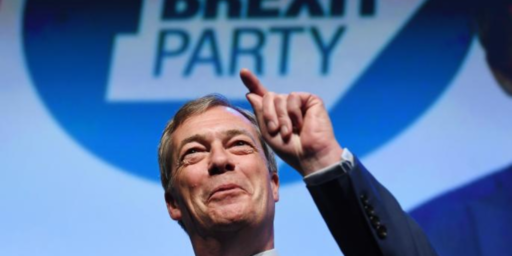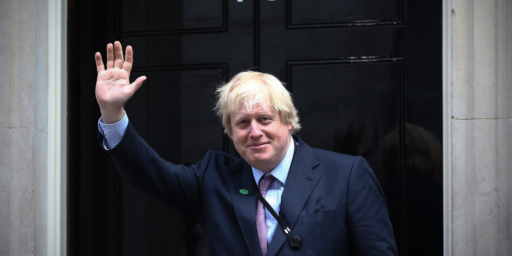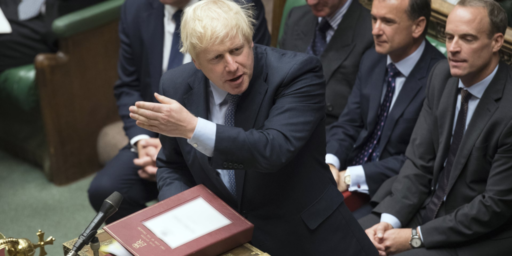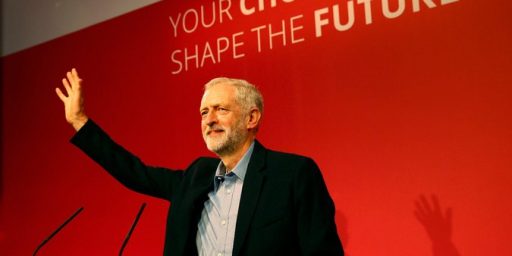Lessons For The U.S. In The British Elections?
What lessons are there for the United States in general, and Democrats in particular, in last weeks British election?

Inevitably, the Labour Party’s loss last week in the British General Election is leading some analysts to make conclusions about what the result might portend for the United States for both the Republican and Democratic parties:
LONDON — Britain was still counting the final votes in its landmark election early Friday morning when Democrats and Republicans on the other side of the Atlantic began asking what Prime Minister Boris Johnson’s landslide victory meant for them: Was it a good omen for President Trump’s re-election chances in 2020, a cautionary tale for Democrats, or both?
It had happened before, in June 2016: Britain’s angry vote to leave the European Union was seen as a canary-in-the-coal-mine for Mr. Trump’s insurgent victory over Hillary Clinton five months later. On Friday in the Oval Office, Mr. Trump latched on to the idea that history might repeat itself.
“I think that might be a harbinger of what’s to come in our country,” he said of Mr. Johnson’s big win.
But if there are parallels, there are also important differences between this British election and the American one next year.
Mr. Johnson appealed to the same populist sentiments that fueled the 2016 votes in both countries. But unlike in the United States, he also seized on a sense of nationwide exhaustion with Brexit, a desire to break the political deadlock and, as he put it, “Get Brexit Done.”
(…)
For Republicans, who have fully embraced Mr. Trump, Mr. Johnson’s victory shows not just the continuing potency of populism but also its limits. For Democrats, who have been enmeshed in a battle between their progressive and moderate wings, the Labour Party’s defeat is a useful example, since party officials have long debated the risks of tacking to the left.
Still, there is no equivalent in the crowded Democratic presidential field to Mr. Corbyn, a deeply divisive figure whom several Labour officials accused of blowing an election that his party could have won.
“There’s going to be a huge debate about why Labour lost, which has ramifications in the United States,” said Thomas Wright, director of the Center for the United States and Europe at the Brookings Institution.
“Some Democrats will say it lost because Corbyn was unpopular and the party had an anti-Semitism problem,” Mr. Wright said. “Others will say the party’s left-wing economic policy was the problem.”(…)
On the Democratic side, liberal figures like Ms. Warren and Mr. Sanders kept Mr. Corbyn at arm’s length — a reflection, analysts said, of the accusations of deep-rooted anti-Semitism in the Labour Party, as well as the belief that he was not going to do well. Among prominent Democrats, only Representative Alexandria Ocasio-Cortez, Democrat of New York and a supporter of Mr. Sanders, publicly endorsed Mr. Corbyn’s party. (A top official in Mr. Sanders’ campaign, however, also posted a message of support Thursday on Twitter. )
Stephen K. Bannon, former chief strategist to Mr. Trump, contends that the president’s victory in 2016 was “inextricably linked” to the Brexit vote. He views Mr. Johnson’s success as revealing deeper political currents that could threaten the chances of the Democratic nominee in 2020.
“It’s not just about Corbyn,” he said. “If they don’t grasp the reality of the rejection of the program of Corbyn, they’re going to get a brutal lesson.”
But Mr. Bannon said the election also held lessons for populists on the right. Mr. Johnson’s rebuff of the Brexit Party, which had proposed campaigning together on a hard-line, pro-Brexit platform, will free the prime minister to try to draw the Conservative Party back to the political center.
“You will see a limited appetite for populism in the Tory party,” Mr. Bannon said. “They see that they didn’t need it.”
Trying to draw analogies between the outcome of elections in foreign countries to what might happen in the United States, or vice versa, is usually a mistake. While there are plenty of similarities between the United Kingdom and the United States, there are also significant differences. In addition to the obvious structural differences between our two Federal/Presidential system and Great Britain’s Parliamentary system, there are also cultural and political differences that make comparisons between the two nations difficult. The most obvious, of course, is the fact that the United States is much more of a center-right nation than most of the rest of the world, meaning that comparing the outcome of the British elections and using that to try to predict what might happen here is something that should be done sparingly.
The other difference to keep in mind is the difference between our political culture and the rest of the world. Primarily, this can be seen in the nature of our major political parties and those of the rest of the world. While the British Conservative Party is certainly conservative in the context of the British political system, it is certainly less conservative than the Republican Party here in the United States. The same is true of the differences between the Democratic Party and the Labour Party. This is even more true with respect to other nations with multiple political parties such as Germany and Israel. Perhaps Inevitably, the division between “left” and “right” is seemingly nearly universal, but what constitutes “left” and “right” varies so significantly that it’s often meaningless to try to equate political systems and election outcomes.
Those caveats aren’t stopping analysts at places such as The New York Times and Politico from opining on the subject, and it’s not stopping Joe Biden from jumping on the outcome in the United Kingdom to use as something of a cudgel against Elizabeth Warren and Bernie Sanders:
Former Vice President Joe Biden on Thursday sought to draw parallels between the results of the United Kingdom’s general election and the 2020 White House race — arguing that British Prime Minister Boris Johnson’s resounding victory should warn Democrats against veering too far left in their fight to defeat President Donald Trump.
“Boris Johnson is winning in a walk,” Biden, a leading Democratic presidential candidate, told attendees of a campaign fundraiser in San Francisco. The prime minister’s Conservative Party captured an overwhelming parliamentary majority in Thursday’s election, taking dozens of seats in Britain’s House of Commons from opposition leader Jeremy Corbyn’s Labour Party.
Predicting news headlines reporting the thumping by Johnson’s Tories, Biden said: “Look what happens when the Labour Party moves so, so far to the left. It comes up with ideas that are not able to be contained within a rational basis quickly.”
Biden went on to assert that the prime minister’s triumph would change public perceptions regarding Trump’s odds of re-election. “You’re also going to see people saying, ‘My God, Boris Johnson, who is kind of a physical and emotional clone of the president, is able to win,'” he said.
Biden has advanced a more moderate political ideology throughout the Democratic primary, criticizing sweeping policy proposals from the field’s leading progressive contenders, Sens. Bernie Sanders of Vermont and Elizabeth Warren of Massachusetts.
The vast majority of the party and the broader electorate, Biden has claimed, are not as liberal as those candidates would suggest, and instead are seeking a sense of national unity in a post-Trump era and a restoration of America’s role on the world stage.
Bret Stephens raises many of the same warnings at The New York Times:
That’s a lesson Democrats ought to draw, quickly and clearly, from the thumping victory Boris Johnson won for the Conservative Party on Thursday. As recently as September, some left-wing pundits and politicians were glibly writing off Johnson as a “failed prime minister,” peddling a “fantasy” of a renegotiated Brexit and facing “political disgrace” after losing his majority in Parliament.
Today, Johnson has renegotiated Brexit, the Tories have their largest majority since 1987, and Labour has sustained its worst defeat since 1935.
How did he do this? In four ways, each of which has parallels with Trump.
First, Johnson was fortunate in his political foes. He ran against the most avowedly leftist frontbench the Labour Party has put forward since the early 1980s. Labour leader Jeremy Corbyn proudly calls himself a “socialist.” He rails against a “rigged system” that supposedly exists for the benefit of a handful of billionaires. His campaign promised free college, dramatic increases in health spending, a hike in the minimum wage, massive infrastructure spending, new taxes on the rich, and a “new green deal.”
Sound familiar? It’s the Warren-Sanders manifesto, only with £ rather than $ signs attached.
Second, Johnson was forward looking. He ran as the candidate of Brexit — not, as Theresa May had, as its reluctant and dutiful custodian, but as its persevering and happy warrior. Brexit wasn’t just about unyoking the U.K. from the E.U. It was also a statement of British self-belief, self-reliance and capacity for self-rule.
(…)
Third, Johnson was attuned to the moment. The prime minister is an ideological opportunist, not a purist. This upsets his critics on the right, who dislike some of his big-spending promises. And it confirms the view of his critics on the left, who see his political plasticity as being of a piece with his moral plasticity.
(…)
Finally, Johnson has benefited from critics whose mode of analysis is that anything and everything he does is dumb, dishonest, wretched and ruinous. Lately, they warn that he will bring about the end of the country itself. Similarly in the United States, some anti-Trump pundits have been forecasting economic decline and doom for three years straight as the economy continues to grow and unemployment plummets.
Bad things can — and, inevitably, will — happen. In the meantime, what we have is a trans-Atlantic case of boys crying wolf. Does it ever occur to the critics that, by constantly inferring or predicting the worst about either man, they make their less-than-worst moments look good, and their good ones seem positively great?
To be sure, I think there is some relevance for Democrats here in the United States in the idea that the Labour Party under Jeremy Corbyn had moved too far left and fallen out of sync with some of its bellwether voters. This is one of the reasons, no doubt, why conservatives were able to make gains in areas of the country that had become dominated by Labour in recent decades and why Conservative candidates were able to win, albeit in several cases narrowly, in constituencies that had been consistently Labour for decades. Well before the election, this problem was recognized by many inside Labour who were convinced that the party would not win a General Election until it ousted Corbyn as its leader. With Corbyn preparing to step down by March, they have the opportunity to do that. At that point, they would do well to harken back to its own history and note that the failures of Labour under Thatcher were not reversed until the rise of politicians like Tony Blair and “New Labour” that they were able to shed the skin of leaders such as Neil Kinnock who, like Corbyn, led the party to two consecutive General Election losses.
In that respect, I suppose there is a lesson for Democrats in what happened last Thursday. While the primary issue in the United Kingdom was Brexit, something for which there is no real commonality here in the United States, it also seems unmistakable to conclude that the Labour Party lost in no small part because it had strayed from the center-left party that it used to be, thus allowing the Conservatives to make advances among traditional Labour voters who felt that the Corbyn-led party did not reflect their values. Democrats stand at risk of making the same mistake if they listen to the progressive wing of their party and nominate someone out of step with the mainstream of American politics. This, in essence, is the argument of the entire Biden campaign, but it’s also a theme that has been picked up by other candidates like Pete Buttigieg.
Notwithstanding the impending impeachment, which the President will most assuredly survive, it’s still within the realm of possibility that he will be re-elected in November. That will become even more likely if Democrats nominate a candidate like Bernie Sanders or Elizabeth Warren. While neither of these candidates is as odious as Corbyn, it is still a fact that they are to the left both of their own arty and the American public in general. Nominating them would be like giving Trump the same kind of gift Democrats gave him in 2016 when they nominated the only candidate with negative favorable ratings as high as his were. That allowed Trump to exploit the disdain for Clinton to his advantage. That lesson, if nothing else, is something that Democrats ought to keep in mind as they begin the process of selecting their nominee.






I’m reminded of that guy who knew half his advertising money was wasted, but just didn’t know which half. I’m also reminded on this quotation from Philip Roth: History is really only the path by which the unexpected becomes the inevitable.
What’s the lesson? I’ve no idea.
I think the lesson is not to run with Jeremy Corbyn as the head of our party. He has a negative forty approval rating, and he waffled on the most important issue.
Had the Labour Party run with a more standard candidate, there might be a parallel — a rise of nationalism, etc. — but this is the equivalent of running a medical experiment on the safety of a flu vaccine, and having half of the participants shot in a mass shooting. And pattern to the deaths has very little to do with the vaccine’s safety.
(Caveat: I visit the UK often, but my knowledge of UK politics is spotty at best.)
It looks to me like the common themes are people resisting social progress and demographic change. It’s the entitled (whether class or race or both) versus the rising tide of the other. In the UK it’s London vs. Not-London. In France it’s Paris vs. Not-Paris. In this country it’s California vs. Not-California. Urban, diverse and socially advanced vs. rural, white and socially backward.
The goobers don’t like all them secular, diverse big city folk with their ideas and their rules, why can’t it just be like it was in some imaginary past when the world was static and unchanging and we all knew who we were better than?
As to the lessons: maybe, don’t use referenda hoping to get out of a tight political spot?
I’m guessing Warren has the ability to “pivot” to the center for the general election campaign.
@Michael Reynolds:
trouble with that view is that labours vote dropped in london as well and in all the big cities. There wasn’t a single area of the country where they increased or held their vote.
Basically labour ran a campaign with a bad leader , a bad manifesto and a brexit policy that didn’t really satisfy anyone. They also had a party that was split (just before the vote, 15 ex labour mp’s took ads in their local papers advising their former voters to vote against labour).
Their campaign was generally also unfocused and seemed to be just throwing mud at a wall to see what stuck. There was an interesting observation from a Labour media chap who during the campaign heard another labour press officer commenting how bad the tory press conferences were as “they’re really boring, they’re just saying the same stuff again and again”.
Basically if you go into an election with a leader whose approval ratings are -40% then you really do need to have a united party with a brilliant focused campaign and a very popular set of policies.
Labour had none of those things.
@kb:
I don’t think we are at odds on this. The underling thrust of the anti-immigration, anti-globalist, anti-tolerance vote paired with Corbyn’s 1930’s era economics, personal loathsomeness and anti-semitism are two sides of a failed system.
I guess we’ll find out in November if we’re going down that same path.
Key point for Democrats:
Don’t get mired in controversy on your stance about leaving the European Union!
🙂
(Please contact me re. my consultancy fee)
Very true.
An American “conservative” would probably categorise me as a “leftist” for supporting universal state health and welfare provision, progressive taxation, arms regulation, environmental protection, state economic intervention etc.
I could reply: do you subscribe to monarchy? an established church? hereditary aristocracy? the old corporations? a traditionalist constitution? the priority of order over markets?
On those grounds I’m the conservative and you’re a wild eyed Jacobin.
OTOH the Conservative Party in Britain has in part become badly damaged by the tragic legacy of Margaret Thatcher and the shared vulgar capitalist/populist “memespace” of transatlantic “conservative” discourse.
I’m more sympathetic to the German CDU than the British Conservatives lately.
Which is ironically why I, a conservative labourite, end up voting Liberal Democrat!
Now, if only I could persuade the CDU re. the merits of Hapsburg Restoration 🙂
@Michael Reynolds:
This is an important line of enquiry.
John Elledge has some thoughts along similar lines.
Also some analysis from the New Economics Foundation.
My opinion though is still that cultural/social change factors are secondary to old fashioned (and ameliorable) economic and broad) welfare issues, and above all the incredibility of Corbyn as PM and the stupid “and a f*ckin’ pony” manifesto.
1) Don’t be wishy-washy on the most important question of the election
2) As always, in the end it’s a popularity contest. Being right is less important than being popular.
3) Don’t run someone hugely unpopular as the face of your party.
In reference to #1 and the US, support impeachment enthusiastically, campaign on why it was the right thing to do, and do not waver.
In reference to #2 and the US, facts and statistics don’t win many voters. Stories and personality do. Which is probably why Biden stubbornly remains at or near the top of every poll, despite being the weakest in terms of actual solutions to problems. It’s part of Buttigieg’s viability as well. The…technocrats (not intended as a pejorative-it’s where my personality is too) like Warren and Sanders (and Clinton in 2016) struggle to make that personal connection and (I think) need to up their game in that aspect.
In reference to #3 in the US…I have to hope we learned our lesson with Hillary even though apparently Labour didn’t. It wasn’t *fair* that she’s so unpopular, but the fact is the smear machine of decades worked. It’s actually my main fear of a Warren candidacy (who I really like myself). The slurs and most of the negative BS are neither fair nor factual, but may be too ingrained to overcome.